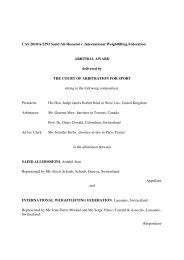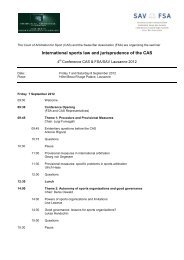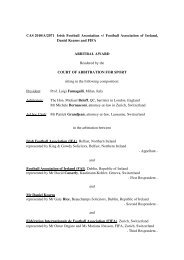(CAS) Bulletin - Tribunal Arbitral du Sport / TAS
(CAS) Bulletin - Tribunal Arbitral du Sport / TAS
(CAS) Bulletin - Tribunal Arbitral du Sport / TAS
Create successful ePaper yourself
Turn your PDF publications into a flip-book with our unique Google optimized e-Paper software.
Arbitration <strong>CAS</strong> 2011/O/2422<br />
United States Olympic Committee (USOC) v. International Olympic<br />
Committee (IOC)<br />
4 October 2011<br />
Olympics; doping; validity and<br />
enforceability of a rule prohibiting<br />
Cycling; doped athletes doping/use from of participation a prohibited<br />
in<br />
method; the next Olympic interpretation Games; of defi the nition wording<br />
of<br />
of eligibility a Commitment rules; defi signed nition by of by sanctions; the rider;<br />
payment proper characterisation of a contribution as of a the condition rule;<br />
for consistency the Rider’s with reinstatement<br />
the WADA Code;<br />
principle of autonomy of the association;<br />
consistency with the Olympic Charter;<br />
principle of double jeopardy or ne bis in<br />
idem<br />
Panel:<br />
Prof. Richard McLaren (Canada), President<br />
Mr Michele Bernasconi (Switzerland)<br />
Mr David Rivkin (USA)<br />
Relevant facts<br />
The United States Olympic Committee (USOC; the<br />
“ Claimant ”) is the National Olympic Committee of<br />
the United States of America (USA), responsible for<br />
the US Olympic Teams. It has its seat in Colorado<br />
Springs, USA.<br />
The International Olympic Committee (IOC; the<br />
“ Respondent ”) is “ an international non-governmental not<br />
for profi t organization of unlimited <strong>du</strong>ration, in the form of a<br />
Swiss association with the status of a legal person recognized by<br />
the Swiss Federal Council ” (see Olympic Charter (OC),<br />
Article 15(1)). It has its seat in Lausanne, Switzerland.<br />
The IOC is governed by Swiss private law, in articles<br />
60-79 of the Swiss Civil Code (CCS).<br />
The IOC Executive Board, at its meeting in Osaka,<br />
Japan on 27 June 2008, enacted the following rule<br />
which has come to be known as the “Osaka Rule” and<br />
is referred to as the “Decision ” by the USOC and the<br />
“ IOC Regulation ” by the IOC. The Panel will refer to<br />
it as the “IOC Regulation ” or the “Regulation ”.<br />
“ The IOC Executive Board, in accordance with Rule 19.3.10<br />
OC and pursuant to Rule 45 OC, hereby issues the following<br />
rules regarding participation in the Olympic Games:<br />
1. Any person who has been sanctioned with a suspension<br />
of more than six months by any anti-doping organization<br />
for any violation of any anti-doping regulations may<br />
not participate, in any capacity, in the next edition of<br />
the Games of the Olympiad and of the Olympic Winter<br />
Games following the date of expiry of such suspension.<br />
2. These Regulations apply to violations of any anti-doping<br />
regulations that are committed as of 1 July 2008. They are<br />
notifi ed to all International Federations, to all National<br />
Olympic Committee and to all Organizing Committees<br />
for the Olympic Games ”.<br />
The IOC Regulation came into effect in July 2008<br />
but does not appear to have impacted any athletes<br />
who applied to attend the Vancouver Winter Olympic<br />
Games in February 2010. However, the IOC<br />
Regulation will impact a number of athletes around<br />
the world for the 2012 Summer Olympic Games in<br />
London. The IOC Regulation appears to have also<br />
affected doping adjudications since it came into<br />
effect.<br />
In one of those athletes’ situations, the IOC<br />
Regulation came under scrutiny before AAA/<br />
North American Court of Arbitration for <strong>Sport</strong> in<br />
the case USADA v. LaShawn Merritt (referred to<br />
as the “Merritt Award ”). In the Merritt Award, the<br />
AAA Panel was required to determine whether the<br />
IOC Regulation could be applied to Mr. Merritt, who<br />
had tested positive for the banned substance DHEA<br />
in a series of out-of-competition tests. Both the<br />
World Anti-Doping Agency (WADA) and the IOC<br />
were invited, but declined to submit their respective<br />
positions as to whether the IOC Regulation could<br />
validly be applied in this situation. In the Merritt<br />
Award, the Panel re<strong>du</strong>ced the usual suspension<br />
on a fi nding of exceptional circumstances. It held<br />
that: (i) Mr. Merritt had no intention to dope and<br />
inadvertently used a banned substance; (ii) following<br />
his suspension, which would end on 27 July 2011,<br />
Mr. Merritt would be eligible to compete in the<br />
competitions of all Signatories to the Code of the<br />
World Anti-Doping Agency (the “WADA Code ”),<br />
including the USOC, the IAAF and IOC; and (iii)<br />
the IOC Regulation could not be used to prevent Mr.<br />
Merritt from competing in the 2012 Olympic Trials<br />
or from having his name submitted from entry to the<br />
Olympic Games. A preventive appeal was fi led by the<br />
Jurisprudence majeure / Leading cases<br />
-<br />
143





